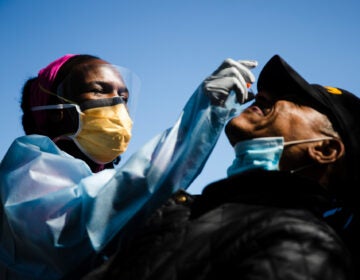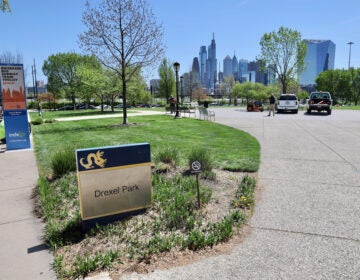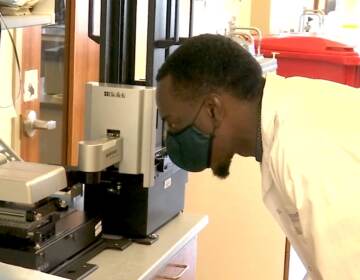`We have been here, we have always been here’: Town hall event to celebrate Black, queer scientists
In panels running Tuesday through Friday, Black queer scientists will talk about their experiences, research, and advice for those coming after them.
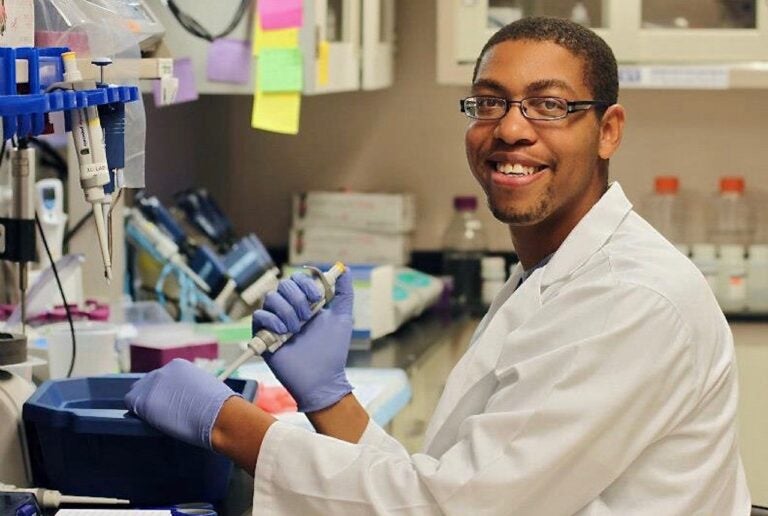
Antentor Hinton Jr. of Vanderbilt University helped to organize a Black Queer Town Hall in STEM. (Courtesy of Baylor College of Medicine)
Theoretical physicist Chanda Prescod-Weinstein always liked counting things, like the Count on “Sesame Street,” and doing math. Her mother took her to see “A Brief History of Time,” a documentary about physicist Stephen Hawking, which led her to study physics and astronomy.
“And so I think it was pretty natural that one of the things that happened when I started university, was looking around and looking for people who were like me and who shared my demographic background, who were Black, who were working class, who were also socially assigned female at birth, and realizing that the numbers didn’t add up in a way that made sense if equality was really in practice,” Prescod-Weinstein said.
At the time, she had dreadlocks, and when she told people she was majoring in physics, they would say she didn’t look like a physics major.
“And then, when I would complain to people, ‘Oh, somebody made that comment to me again,’ they would go, ‘Oh, but it’s because of the way that you dress.’ And I was like: ‘I went to the dining hall in my pajamas this morning like everybody else did, so it had nothing to do with the way that I was dressed.’”
She realized then that if she wanted to understand what was happening even just within the world of physics, she had to study more than just physics. Now, Prescod-Weinstein is both an assistant professor of physics and astronomy and core faculty in women’s and gender studies at the University of New Hampshire.
“My interest in physics is really: I want to understand how the universe works, and understanding how race and gender shape our world is definitely a huge part of how the universe works in our everyday lives.”
Prescod-Weinstein will be one of the featured speakers at an event this week called Black Queer Town Hall in STEM, organized partly by scientists at the University of Pennsylvania. Black queer scientists will talk about their experiences, research, and advice for those coming after them. The panels begin Tuesday, Jan. 12, and run through Friday, Jan. 15.
“It’s a core value in both the Black community and queer community that we fight for the next generation, so that they live in a better world than the one that we lived in,” she said. “It is bittersweet though, because it does mean that you are in some sense fighting for other people to live your dreams, that maybe one day there will be a queer Black girl who can just go to college and study physics and not have to think about racism or sexism or homophobia or transphobia or ableism.”
The organizers of the Black Queer Town Hall in STEM event modeled it after a Black Queer Town Hall event last summer from Bob the Drag Queen and Miss Peppermint, two performers who were featured on “RuPaul’s Drag Race” and were the winner and runner-up in their respective seasons.
Miss Peppermint said they put that event together because they felt it was important to celebrate Black queer voices and talk about how to address racism even within the LGBTQ community. For instance, she pointed out that before 2020, one city’s pride committee did not have any Black people on its board or a position on diversity, so the city had a separate Black pride committee.
After their event and the George Floyd protests last summer, she said, a lot more companies, universities, and organizations are interested in thinking about how they can address historic issues of racial inequity and be more inclusive, and she asked herself and Bob to consult for them.
“I’ve done more in the past six months than I have in the past six years,” Miss Peppermint said.
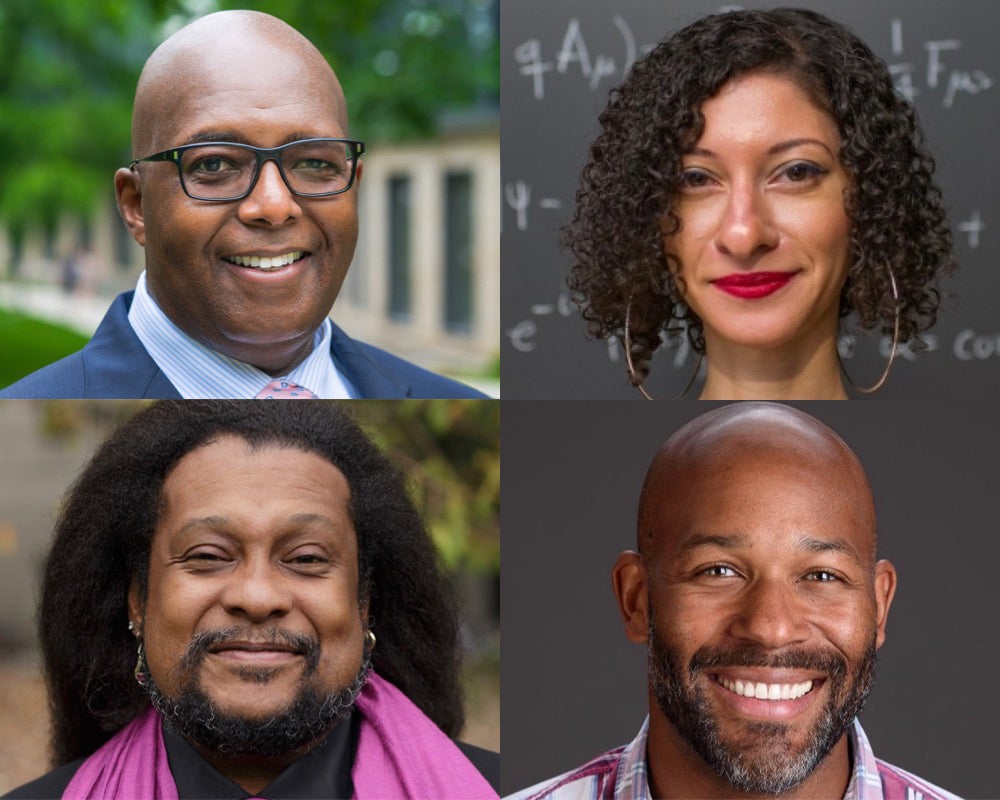
One of the people who saw the Black Queer Town Hall last summer was Ryan Daniels, a graduate student in cell and molecular biology at the University of Pennsylvania. Daniels realized this event could address issues of representation in science as well, with some small changes.
“I could see this being applied everywhere,” Daniels said, “ … wherever Black queer/trans people are, which is everywhere, these types of conversations that were motivated from Bob and Peppermint I think would be applicable anywhere, and I think would be invaluable.”
Part of the goal of the Black Queer Town Hall in STEM event is just to show and celebrate the work of Black queer scientists, to show historically marginalized groups that they belong in science, said Antentor Hinton Jr, who is also helping to organize the event. He is an assistant professor of molecular physiology and biophysics at Vanderbilt University, as well as a postdoctoral fellow at the University of Iowa and the Mayo Clinic.
“People are watching you constantly, so that stress level that’s already a lot on you, for just being of a particular race or background, magnifies every time you share a part of your identity,” he said. “When they all intersect and we are feeling comfortable in telling your story and just believing in who you are and have this journey … you have to really kill it, and what I mean by that is you have to kill the game, so there cannot be an off day for me.”
Cell biologist Derek Applewhite, who is also a featured speaker and an associate professor of biology at Reed College, said he did not have a Black professor throughout his undergraduate and graduate career in science, and that did affect his work.
“When you are siloed trying to do research and you’re failing, and you’re failing and you’re running against walls and you’re frustrated, you start to wonder very easily: Do I belong here? Am I good enough to be here?
“It’s hard when you look around and you don’t see anyone who looks like you … it even more makes you feel like you don’t belong, that you shouldn’t be doing this, that you can’t do this,” Applewhite said.
“Events like this have been a great way for me to be a representative of cell biology and try to reach students, but it also has been kind of frustrating,” he said. “I’m an associate professor, I’ve been doing this for quite some time, and it just seems like now is a time when finally people started to recognize that there are Black scientists out there. We have been here, we have always been here, we’ve been struggling and fighting. I’m happy that our voices are now being heard a little bit more, I’m hoping that this wasn’t just a brief blip in time.”

Get daily updates from WHYY News!
WHYY is your source for fact-based, in-depth journalism and information. As a nonprofit organization, we rely on financial support from readers like you. Please give today.



